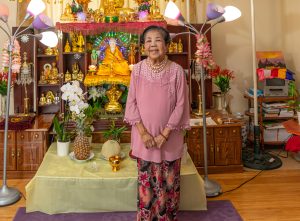 You may know that Fort Wayne boasts the largest population of Burmese immigrants outside of Burma, the Southeast Asian nation now known as Myanmar. It’s that fact that drew Mar Mar Aye to Fort Wayne after fleeing governmental crackdowns in the 1990s. The diminutive 78-year-old is widely known in her native land as possibly the most famous Burmese languagesinger ever.
You may know that Fort Wayne boasts the largest population of Burmese immigrants outside of Burma, the Southeast Asian nation now known as Myanmar. It’s that fact that drew Mar Mar Aye to Fort Wayne after fleeing governmental crackdowns in the 1990s. The diminutive 78-year-old is widely known in her native land as possibly the most famous Burmese languagesinger ever.
She’s also a patient who is receiving hospice services from Stillwater Hospice. Stillwater aides provide personal care, while a nurse case manager ensures that any troubling symptoms of her illness are well controlled.
Because of the support of Stillwater’s nurses, aides, social workers and volunteers, Mar Mar Aye is able to remain in her home, surrounded by the Buddhist altars, peacock decorations and orchids that beautify her life. The walls of her living room are covered with family photos, paintings of Mar Mar Aye performing, and a revered photograph of her and Nobel Prize winner and opposition leader Aung San Suu Kyi sharing an embrace. She noted proudly that her mother and Aung San Suu Kyi’s mother grew up in the same village in Burma.
She was born in Myaungmya, in the Ayeyarwady region of southwestern Burma. Mar Mar Aye started singing when she was 3 years old and made her second album, “Let’s Play on the Rainbow,” which was a national breakthrough, at the age of 13. She worked for Burma’s Broadcasting Service for 16 years and became a member of the National Music Council.
A politically active artist who has written songs in support of the Saffron Revolution and advising citizens to “Vote No!” in a national referendum on a new planned military-backed constitution, Mar Mar Aye left the country for the U.S. in 1998 and has lived here ever since. Because she left Burma due to her outspoken support of democracy, she wasn’t allowed to release her albums and her songs were banned on the radio. Undeterred, she has written two novels, founded a singing academy, and run a music publication house and recording studio. In 2012, she was allowed to visit Burma for a solo outdoor concert in Yangon.
She comes from a musical family: her father played a traditional Burmese instrument called a “hne,” which is similar to an oboe. Her mother was also a singer, and Mar Mar Aye joined her parents in the limelight. They would travel from village to village, performing at the openings of temples and other events.
Burmese traditional music “is like a play,” she said on a recent spring afternoon.
“I play a little bit of everything,” including piano and the harp, she said as her eyes crinkled in a smile.
Mar Mar Aye has a son and a daughter, along with grandchildren. And while she’s not performing publicly, she’s able to host visiting family members, spending meaningful moments with loved ones because the symptoms of her illness are well controlled by interventions from Stillwater Hospice. Music therapy, social support and the compassionate care provided by the Stillwater team have meant that Mar Mar Aye is able to continue living her life, caring for her beloved orchids, and – always – singing.



